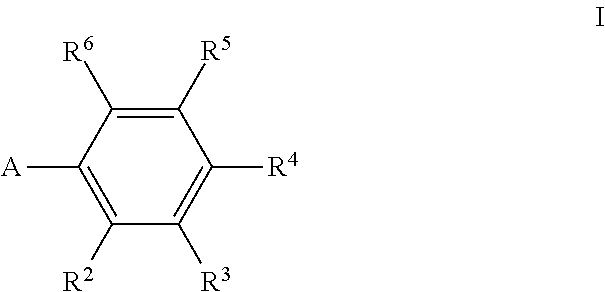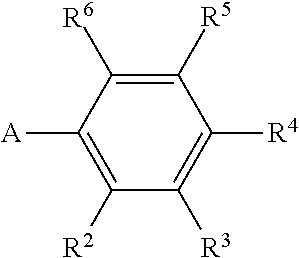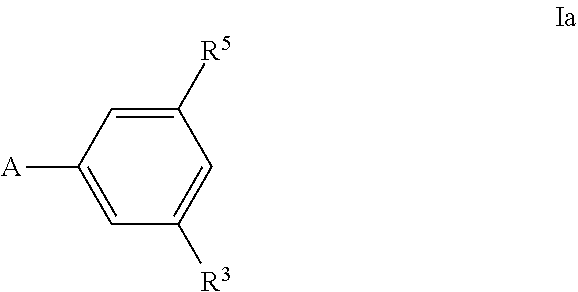Bacterial efflux pump inhibitors
- Summary
- Abstract
- Description
- Claims
- Application Information
AI Technical Summary
Benefits of technology
Problems solved by technology
Method used
Image
Examples
example 1
on of N-(((2S, 4S)-4-aminopyrrolidin-2-yl)methyl)-4,4″-difluoro-[1, 1′:3′, 1′-terphenyl]-5′-carboxamide dihydrochloride
[0194]
[0195]Pd / C (10%, 20 mg) was added to a solution of benzyl (2S, 4S)-4-((tert-butoxycarbonyl)amino)-2-(4,4″-difluoro-[1, 1′:3′, 1′-terphenyl]-5′-carboxamido)methyl)pyrrolidine-1-carboxylate (100 mg, 0.16 mmol) in methanol (10 mL). It was stirred under H2 overnight. The solid was filtered off through a Celite pad and the filtrate was concentrated under reduced pressure to give a residue. The residue was dissolved in MeOH (1 mL) was added HCl solution in dioxane (4 M, 0.1 mL) and it was stirred at room temperature overnight then concentrated under reduced pressure. The crude product was triturated with EtOAc and the white solid was collected by filtration to provide the title compound as white solid (65 mg, 85% yield in two steps). LC / MS: 408.30 (M+H).
[0196]The requisite intermediate was prepared as described in the following paragraph.
[0197]DIPEA (0.112 mL, 0.64 ...
example 2
on of N-(((2S, 4S)-4-aminopyrrolidin-2-yl)methyl)-2-4,4″-difluoro-[1, 1′:3′, 1′-terphenyl]-5′-yl)-2-methylpropanamide dihydrochloride
[0198]
[0199]Pd / C (10%, 20 mg) was added to a solution of benzyl (2S, 4S)-4-((tert-butoxycarbonyl)amino)-2-((2-(4,4″-difluoro-[1, 1′:3,1′-terphenyl]-5′-yl)-2-methylpropanamido)methyl)pyrrolidine-1-carboxylate (100 mg, 0.14 mmol) in methanol (10 mL). It was stirred under H2 overnight. The solid was filtered off through a Celite pad and the filtrate was concentrated under reduced pressure to give a residue. The residue was dissolved in MeOH (1 mL) was added HCl solution in dioxane (4 M, 0.1 mL). It was stirred at room temperature overnight then concentrated under reduced pressure. The crude product was triturated with EtOAc and the white solid was collected by filtration to provide the title compound as white solid (67 mg, 92% yield). 1H NMR (300 MHz, DMSO) δ 9.88 (bs, 1H), 9.32 (bs, 1H), 8.55 (bs, 4H), 8.0 (m, 1H), 7.86-7.81 (m, 3H), 7.75 (s, 1H), 7.56 (...
example 3
, Preparation of N-(((2S)-4-(2-aminopropan-2-yl)pyrrolidin-2-yl)methyl)-4,4″-difluoro-[1,1′:3′, 1″-terphenyl]-5′-carboxamide dihydrochloride
[0205]
[0206]Pd / C (10%, 20 mg) was added to a solution tert-butyl (2-((5S)-1-benzyl-5-((4,4″-difluoro-[1,1′:3′,1″-terphenyl]-5′-ylcarboxamido)methyl)pyrrolidin-3-yl)propan-2-yl)carbamate (24 mg, 0.04 mmol) in methanol (5 mL) was added. The reaction mixture was stirred under H2 overnight. The solid was filtered off through a pad of Celite and concentrated under reduced pressure to provide a residue, which was dissolved in (MeOH (1 mL) was added HCl solution (4 N in dioxane, 0.2 mL). It was stirred at room temperature overnight and solvent was removed under reduced pressure. The residue was triturated with EtOAc and the product was collected as a white powder (11 mg, 56% yield in 2 steps). 1H NMR (300 MHz, CD3OD) δ 8.13 (s, 2H), 8.01 (s, 1H), 7.80 (m, 4H), 7.22 (m, 4H), 4.00 (m, 1H), 3.83 (m, 2H), 3.52 (m, 2H), 2.80 (m, 1H), 2.35 (m, 1H), 1.80 (m, ...
PUM
| Property | Measurement | Unit |
|---|---|---|
| Volume | aaaaa | aaaaa |
| Volume | aaaaa | aaaaa |
| Mass | aaaaa | aaaaa |
Abstract
Description
Claims
Application Information
 Login to View More
Login to View More - Generate Ideas
- Intellectual Property
- Life Sciences
- Materials
- Tech Scout
- Unparalleled Data Quality
- Higher Quality Content
- 60% Fewer Hallucinations
Browse by: Latest US Patents, China's latest patents, Technical Efficacy Thesaurus, Application Domain, Technology Topic, Popular Technical Reports.
© 2025 PatSnap. All rights reserved.Legal|Privacy policy|Modern Slavery Act Transparency Statement|Sitemap|About US| Contact US: help@patsnap.com



